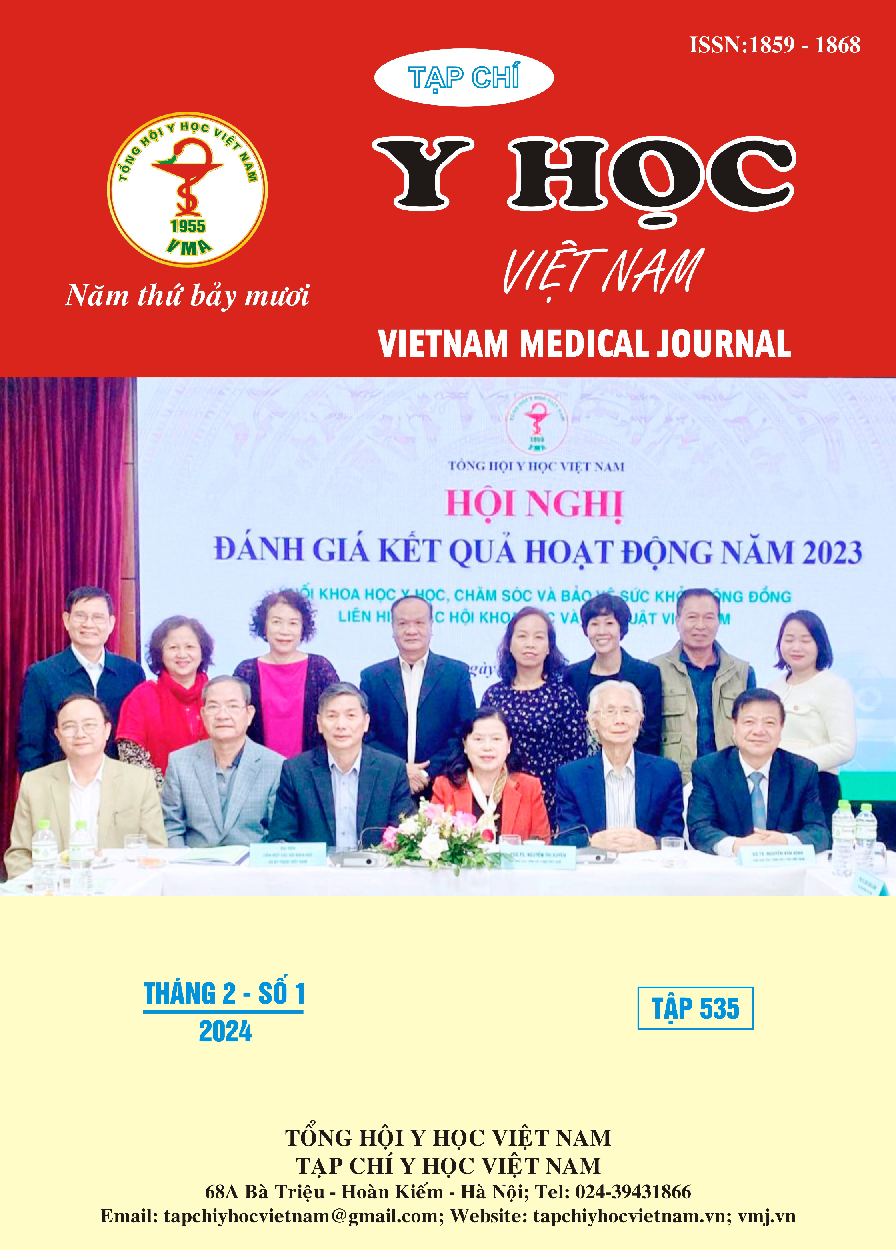TOAST CLASSIFICATION AND SOME GENE VARIANTS RELATED TO BLOOD CLOTTING IN YOUNG PATIENTS WITH ISCHEMIC STROKE
Main Article Content
Abstract
Objective: Describe causes of ischemic stroke according to TOAST classification and the prevalence of some gene variants related to blood clotting in young patients. Subjects and methodology: Cross-sectional study; Subjects are patients aged 18 - 45 years old with a diagnosis of ischemic stroke and undergoing genetic testing for thrombosis risk, treated at Bach Mai hospital from January 2022 to September 2023. Results: The study enrolled 59 patients. The average age is 35.78 ± 5.93, men accounted for 62.7%. Classifying the causes of ischemic stroke according to TOAST, the group of undetermined cause predominates with 59.3%. The rate of ischemic stroke due to undetermined etiology in younger age groups (< 34 years old) is statistically significantly higher than in older age groups (35 - 45 years old) with p = 0.007. No cases are detected carrying the FVL, FII G20210A, and FXIII Val34Leu mutations. The PAI-1 4G/5G polymorphism is the most common gene variant with a rate of 84.7% (57.6% heterozygous 4G/5G, 27.1% homozygous 4G/4G). Next are MTHFR A1298C (47.5% heterozygous, 5.1% homozygous) and MTHFR C677T (35.6% heterozygous, 5.1% homozygous). HR2 mutation only occurs in 3 heterozygous cases, accounting for 5.1%. Conclusion: Young patients with ischemic stroke are less likely to have common vascular risk factors. Ischemic stroke of unknown etiology predominates in young people. FVL, FII G20210A, and FXIII Val34Leu mutations are rare, not a notable risk factor for ischemic stroke. HR2 mutations are rare and there is no evidence of an association with an increased risk of ischemic stroke. The PAI-1 4G/5G polymorphism is very common; in addition, MTHFR C677T and MTHFR A1298C mutations are also found with high frequency. These three gene variants should be considered as a risk factor in young patients with ischemic stroke.
Article Details
References
2. Saini V, Guada L, Yavagal DR. Global Epidemiology of Stroke and Access to Acute Ischemic Stroke Interventions. Neurology. 2021;97(20 Supplement 2):S6-S16. doi: 10.1212/ WNL.0000000000012781
3. Inherited Thrombophilia and the Risk of Arterial Ischemic Stroke: A Systematic Review and Meta-Analysis - PubMed. Accessed October 24, 2023. https://pubmed.ncbi. nlm.nih.gov/31549567/
4. López Ramírez Y, Vivenes M, Miller A, et al. Prevalence of the coagulation factor XIII polymorphism Val34Leu in women with recurrent miscarriage. Clin Chim Acta. 2006;374(1-2):69-74. doi:10.1016/j.cca.2006.05.032
5. Guodong Jin null, Beili Feng null, Peng Chen null, et al. Coagulation factor XIII-A Val34Leu polymorphism and the risk of coronary artery disease and myocardial infarction in a Chinese Han population. Clin Appl Thromb Hemost. 2011;17(2): 208-213. doi:10.1177/ 1076029609355152
6. Shemirani AH, Antalfi B, Pongrácz E, Mezei ZA, Bereczky Z, Csiki Z. Factor XIII-A subunit Val34Leu polymorphism in fatal atherothrombotic ischemic stroke. Blood Coagul Fibrinolysis. 2014;25(4): 364-368. doi: 10.1097/MBC. 0000000000000055
7. Alhenc-Gelas M, Nicaud V, Gandrille S, et al. The factor V gene A4070G mutation and the risk of venous thrombosis. Thromb Haemost. 1999;81(2):193-197.
8. Otrock ZK, Taher AT, Shamseddeen WA, Zaatari G, Bazarbachi A, Mahfouz RA. Factor V HR2 haplotype: a risk factor for venous thromboembolism in individuals with absence of Factor V Leiden. Ann Hematol. 2008;87(12):1013-1016. doi:10.1007/s00277-008-0543-3
9. M’barek L, Sakka S, Meghdiche F, et al. MTHFR (C677T, A1298C), FV Leiden polymorphisms, and the prothrombin G20210A mutation in arterial ischemic stroke among young tunisian adults. Metab Brain Dis. 2021;36(3):421-428. doi:10.1007/s11011-020-00663-7
10. Qin X, Spence JD, Li J, et al. Interaction of serum vitamin B12 and folate with MTHFR genotypes on risk of ischemic stroke. Neurology. 2020;94(11): e1126-e1136. doi: 10.1212/WNL. 0000000000008932


